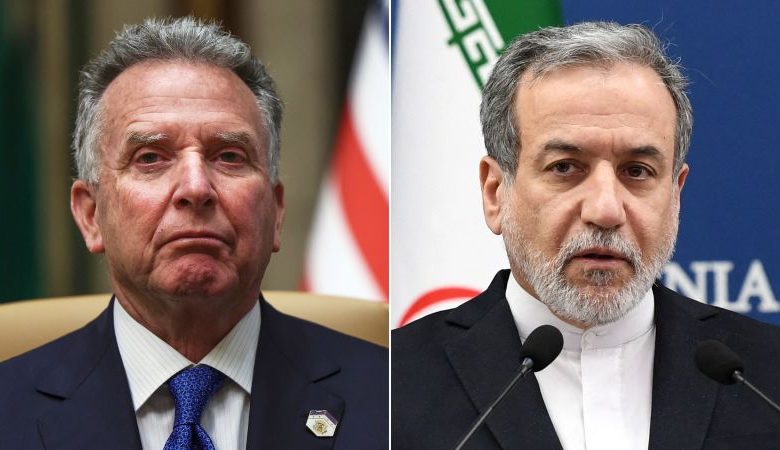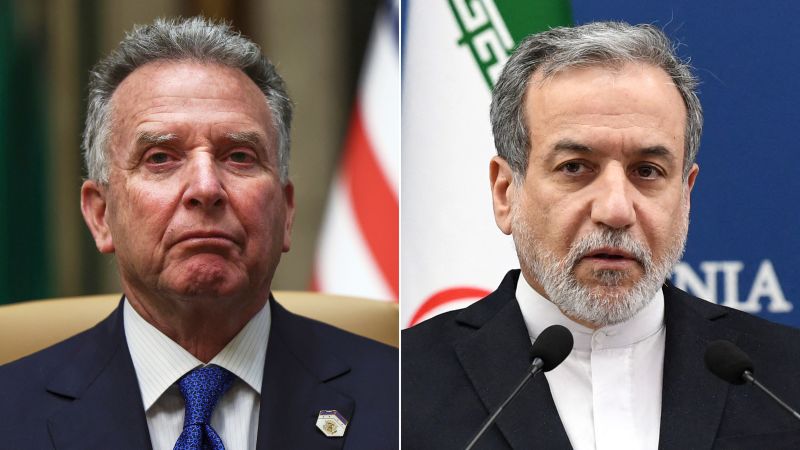The US and Iran are set to meet for a second round of nuclear talks. Here’s what we know


The United States and Iran are due to hold their second round of nuclear talks on Saturday, as what both sides are looking for in a deal begins to take shape.
Delegations from both countries met in Oman last weekend for talks mediated by the Gulf Arab nation. The next round is being held in Rome.
Since last weekend’s talks, which both parties described as “constructive,” remarks from various members of the Trump administration have flip-flopped, oscillating between maximalist demands that Iran has said were “red lines” and a more conciliatory approach the Islamic Republic may concede to.
This comes amid threats by President Donald Trump that the US will resort to military strikes against Iranian nuclear sites, with Israel’s help, should Tehran fail to reach a deal with its interlocutors.
Here’s what we know about the talks.
How the two sides got here
A nuclear deal was reached in 2015 between Iran and world powers, including the US. Under the deal, Iran had agreed to limit its nuclear program in exchange for the lifting of sanctions.
That agreement was, however, abandoned by Trump in 2018 during his first presidential term. Iran retaliated by resuming its nuclear activities and has so far advanced its program of uranium enrichment up to 60% purity, closer to the roughly 90% level that is weapons grade.
Iran insists its nuclear program is peaceful.
Days later, Iranian President Masoud Pezeshkian said the Islamic Republic rejected direct negotiations with the US. He said however that Iran’s response, delivered by Oman, left open the possibility of indirect talks with Washington.
What does Trump want and what are the key issues?
Trump has said that the deal he seeks with Iran would not be similar to the 2015 agreement inked under the Obama administration.
“It’ll be different, and maybe a lot stronger,” he said.
Comments from Middle East envoy Steve Witkoff, who represented the US last weekend, have suggested differently as of late.
Iran has in recent weeks been vocal with its concerns about striking a nuclear deal with Trump, who it says has a history of backtracking. The Islamic Republic has also voiced objections to any deal that fully dismantles its nuclear program, as opposed to only limiting its uranium enrichment to civilian-only use – as was stipulated under the 2015 agreement.
Formally known as the Joint Comprehensive Plan of Action (JCPOA), the 2015 deal ensured through a number of mechanisms that Iran’s nuclear program would be exclusively peaceful.
But conflicting remarks from US officials before and after last Saturday’s meeting have muddied Washington’s demands.
Witkoff, who represented the US last weekend, said that moving forward, talks with Iran would be about verification of its nuclear program, but stopped short of mentioning a demand to fully dismantle Iran’s nuclear program, as other US officials have said in the past. In other words, indicating a deal that would be similar to the Obama-brokered agreement.
“The conversation with the Iranians will be much about two critical points,” Witkoff told Fox News on Monday. The first is verification of uranium enrichment, “and ultimately verification on weaponization, that includes missiles, type of missiles that they have stockpiled there, and it includes the trigger for a bomb.”
However, Witkoff later reversed his position in a statement on X in which he said any final deal with Iran would require it to “stop and eliminate its nuclear enrichment and weaponization program.”
Other officials have been hawkish on what the US expects from Iran. On Sunday, a day after Witkoff started talks with Iranian negotiators in Oman, US Defense Secretary Pete Hegseth called on Tehran to fully dismantle its nuclear program.
“Iran, come to the table, negotiate, full dismantlement of your nuclear capabilities,” he said on Fox News.
Iranian officials have dismissed that proposal as a non-starter, accusing the US of using it as a pretext to weaken and ultimately topple the Islamic Republic. Tehran is entitled to a civilian nuclear energy program under a UN treaty.
The UN nuclear watchdog has however warned that Iran has been accelerating its enrichment of uranium up to alarming levels.
What is Iran saying?
Iran this week doubled down on its right to enrich uranium and accused the Trump administration of sending mixed signals.
“Iran’s enrichment (program) is a real and genuine matter, and we are ready to build trust regarding potential concerns, but the issue of enrichment is non-negotiable,” Iranian Foreign Minister Abbas Araghchi told reporters on Wednesday, state-run Press TV reported.
Foreign ministry spokesperson Esmaeil Baqaei weighed in early Thursday on X, likening the shifting US position to “a professional foul and an unfair act in football.”
“In diplomacy any such shifting (pushed by hawks who fail to grasp the logic/art of commonsensical deal-making) could simply risk any overtures falling apart,” he wrote. “It could be perceived as lack of seriousness, let alone good faith. … We’re still in testing mode.”
Iranian media has reported that Tehran had set strict terms ahead of the talks with the US, saying that “red lines” include “threatening language” by the Trump administration and “excessive demands regarding Iran’s nuclear program.” The US must also refrain from raising issues relating to Iran’s defense industry, Iranian media said, likely referring to Iran’s ballistic missile program, which the US’ Middle Eastern allies see as a threat to their security.
Meanwhile, Iran’s highest leadership has approached the talks with extreme caution.
In his first comments on the issue since the Iranian and American negotiators met in Oman, Khamenei said Tuesday that Tehran is “neither overly optimistic nor overly pessimistic” about talks with the United States over its nuclear program.
Where does Israel stand?
Israel has been among the staunchest advocates for Iran to fully dismantle its nuclear weapon and never acquire a nuclear bomb.
On Thursday, Israeli Prime Minister Benjamin Netanyahu’s office issued a statement defending his aggressive policy towards Iran, saying, “Israel will not allow Iran to obtain nuclear weapons.”
Dermer was sitting beside Netanyahu in Washington last week when Trump suddenly announced the US-Iran talks would begin imminently. The surprise revelation of the start of negotiations appeared to startle Netanyahu, who has increasingly pushed for a military option against Iran.
Sitting beside Trump at the Oval Office earlier this month, Netanyahu touted a Libya-style nuclear deal between the US and Iran, which in 2003 dismantled the North African nation’s nuclear program in the hopes of ushering in a new era of relations with the US after its two-decade oil embargo on Moammar Gadhafi’s regime.
After relinquishing its nuclear program, Libya descended into civil war following a 2011 NATO-backed uprising that toppled Gadhafi’s regime and led to his killing. Iranian officials have long warned that a similar deal would be rejected from the outset.
Dermer and Mossad director David Barnea met Friday with Witkoff in Paris ahead of the second round of Iran talks.
Earlier this year, US intelligence agencies warned both the Biden and Trump administrations that Israel would likely attempt to strike facilities key to Iran’s nuclear program this year, according to sources familiar with the assessments.
However, The New York Times reported Wednesday that Trump had urged Israel not to strike Iran’s nuclear sites as soon as next month in order to let talks with Iran play out, which could impact planned engagements for Trump’s national security team in the coming days.
The Israeli Prime Minister’s Office did not deny the veracity of the article, instead asserting that Israel’s actions have delayed Iran’s nuclear program.
Responding to the New York Times’ report that he’d waved off Israeli strikes, Trump said on Thursday: “I wouldn’t say waved off,” but “I’m not in a rush to do it because I think that Iran has a chance to have a great country and to live happily without death.”
“I hope they (Iran) want to talk, it’s going to be very good for them if they do, and I’d like to see Iran thrive in the future, do fantastically well.”



